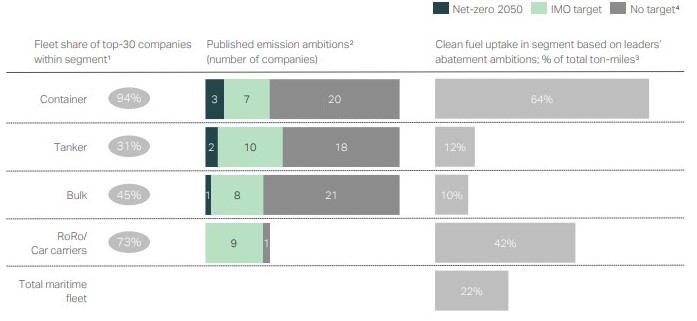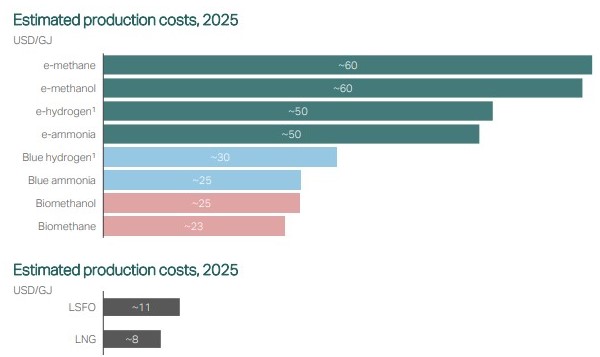The Mærsk Mc-Kinney Møller Center for Zero Carbon Shipping concludes that it is possible to decarbonize shipping by 2050 if industry action is combined with firm regulation.
More specifically, the report “Industry Transition Strategy” notes that a carbon levy could start as low as USD 50/tCO2-eq if earmarked and returned to the early adopters of alternative maritime fuels.
In fact, during an exclusive interview with SAFETY4SEA, Mr. Claus Winter Graugaard, Head of Onboard Vessel Solutions at the Mærsk Mc-Kinney Møller Center for Zero Carbon Shipping, had warned that this decade is critical to make substantial progress if we plan to decarbonize global shipping by 2050.
We need to start developing the solutions and work on HOW we future proof shipping. Key challenges include mobilizing a very decentralized and truly global, hard-to-abate industry and a dependency on technical solutions that doesn’t yet exist in the scale we need them
Mr. Graugaard noted.
In this aspect, four main drivers can accelerate the transition already within this decade:
1. A level playing field through global regulation
A flat carbon levy of USD 230/tCO2-eq implemented in 2025 combined with critical change levers like further energy efficiency, customer willingness to pay and global policies could close the fuel cost gap and bring the maritime industry close to zero carbon by 2050. But it would accumulate almost USD 4 trillion of proceeds while adding to the cost of maritime transportation.
Introducing carbon pricing where funds are earmarked and returned to the early adopters of alternative fuels could close the fuel cost gap at a much lower levy. The accumulated funds collected could be reduced to approximately USD 2 trillion and thereby reduce the cost increase of zero carbon transportation compared to a flat levy with no recycling of proceeds
said the report.
Alternatively, an incrementally growing carbon levy starting at USD 50/tCO2-eq and increased to USD 150/tCO2-eq could generate enough proceeds to not only compensate the early adopters of alternative fuels but accumulate up to USD 300 billion earmarked for supporting developing countries.
2. Competitive alternative marine fuels at scale
Fuel costs typically make up 20-35% of the total cost of operation of a vessel depending on segment and with unsubsidized production costs being 2-8 times higher for alternative marine fuels compared to fossil the incentive to switch is limited.

Alternative fuels must be made commercially viable and available at scale through innovation and development of permits, licenses, standards, regulation, new market mechanisms (e.g., green certificates) and documentation of reduced emissions intensity from a Life Cycle Analysis perspective.
Regulatory considerations on standards and safe operations must be addressed as part of an accelerated scale-up of alternative fuels and the necessary infrastructure
3. Wider adoption of energy efficiency measures
The overall potential for higher energy efficiency in the global fleet remains large. As a starting point, the industry could benefit from an assessment of the emissions reduction potential in existing energy efficiency technologies and operational best practice to pave the way for wider adoption. In parallel new, emerging technologies (e.g. fuel-cells) need to be matured to match new fuel options and reduce the amount of fuel needed in the future.

4. Support to decarbonization front runners
Industry leadership is gaining momentum and if all current shipowner decarbonization commitments are delivered on, 22% of global maritime transportation will be net zero carbon by 2050. These front runners must be widely supported in their efforts and regulatory intervention must be put in place to ensure wider change adoption and prevent margin erosion by closing the cost gap between fossil and alternative fuels.
In marking the launch of the Industry Transition Strategy, CEO of the Mærsk Mc-Kinney Møller Center for Zero Carbon Shipping, Bo-Cerup Simonsen, stated:
This strategy outlines pathways ahead and guides our research and the collaboration with our partners and other public and private players to make it happen. It is still early days and there continues to be many uncertainties, but we believe that an important element in effective collaboration is transparency and that at this stage ‘perfect is the enemy of good

Furthermore, commenting on the need for global regulation, Head of Industry Transition Mads Peter Zacho, said that the world is still very far away from the 1.5-degree and the well below 2-degree pathways outlined by the IPCC.
For this reason, Mr. Zacho notes tht the initial industry leadership needs to be followed by public support through global regulation and policies to ensure industry-wide transformation.






























































